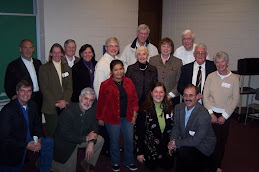U.S.
Priests aren't getting any younger, either. Their average age is
63.
Something's got to give.
"These people have served the church for 30, 40 or 50
years, and now they are retiring or dying and leaving the priesthood,"
said Mary Gautier, senior research associate with Georgetown University
In the Diocese of Venice, Fla., though, Bishop Frank Dewane is
sitting comfortably for the 59 parishes from Bradenton
to Marco Island
Dewane's focus isn't covering next Sunday's Mass; he is charged
with building the next generation of religious leaders.
"We're blessed right now, but we always have to look at
where are we in, say, 25 years or 50 years out," Dewane said.
In 1975, there were 58,909 priests in the United States Georgetown America
Although the 39,600 priests seems plenty for America Southwest Florida have a half-dozen
or more Masses, often simultaneously on church campuses, to accommodate
residents, tourists and seasonal residents.
"I don't know of any bishop who believes he has too many
priests," said the Rev. John Guthrie, associate director for the
secretariat of clergy, consecrated life and vocations with the U.S. Conference
of Catholic Bishops.
Nationally, Guthrie said, the ratio of priests to parishioners
in 1950 was 1 to 652, but that climbed to 1 to 1,653 by 2010. That doesn't
account for the millions of Catholics who are not registered with a parish or
regularly attend services.
"There are fewer of us doing more and more work,"
Guthrie said.
When schoolteachers are sick or on vacation, a principal finds
substitute teachers. The same holds true for a church when priests are needed.
A long-term vacancy at school, however, poses more serious
problems: Who will teach students, and will their education suffer because of
instability and inconsistency? The same questions arise for a parish without a
resident priest: Who will provide spiritual guidance and manage the parish? In
some cases, the answer is no one.
"There are places where they only hold Mass once a month
because that's the only time you can get a priest," Gautier said.
The recent sex abuse scandals certainly had an impact on the
priesthood, damaging the reputation of priests and possibly keeping some men
from considering the priesthood.
"Did the scandals hurt? Yes they did," said the Rev.
Cory Mayer, vocations director for the Diocese of Venice and parish
administrator at Ave Maria. "There were victims, and justice needs to be
served. But the good young men see the scandal wasn't part of the church or its
teachings."
The Rev. Rafal Ligenza, parochial vicar at St. William Parish in
Naples , was raised in Poland
"Here, it's being a doctor," said Ligenza, 32.
"There, it was being a priest."
Mayer counsels youth and adults who are contemplating possible
roles within the church. The first and most important trait he seeks is a deep
love for God. Beyond that, a potential priest must be willing to give himself
to Christ, realize he will forever serve the church and be humble.
"The worst thing we can have is an arrogant priest,"
Mayer said.
Beyond established religions with large, permanent church
buildings are a growing number of unofficial or unsanctioned religious
gatherings in parks, strip malls, beaches and schools.
Deborah Rose-Milavec, executive director of Ohio-based
FutureChurch, said people still want to pray and religious leaders still want
to lead a congregation, but the Vatican
"Church is happening, and it will continue to happen,"
Rose-Milavec said. "The big question is how will the official church
respond."
FutureChurch's position is that the Vatican
"They could be brought into roles where they aren't just
making coffee, but making decisions," Rose-Milavec said of women.
Pope Francis is at least willing to listen. In October, an advisory
board of bishops will gather in Rome
"It's the work of the Holy Spirit that will decide that for
us," he said.


